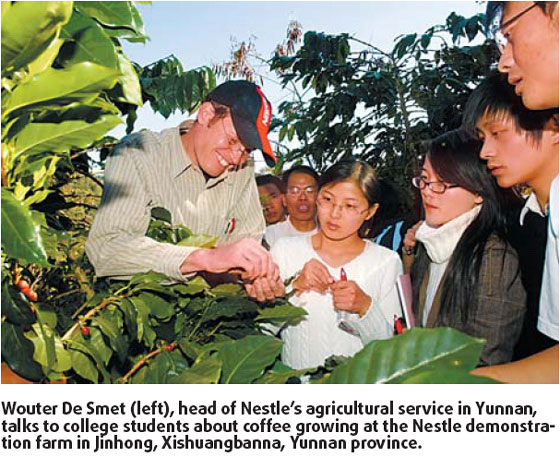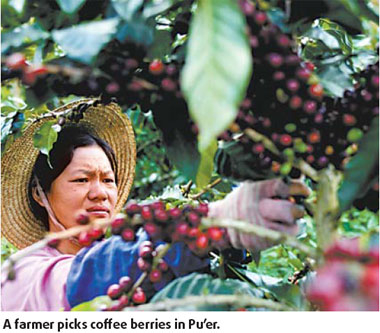


YUNNAN: Chen Jiahua, a farmer in Nanping town of Pu'er City in Southwest China's Yunnan province, drinks tea, not coffee - but coffee is far more important to him. It is his livelihood.
It has become a new way of life for him and his family: The red coffee berries flourishing on his 20-mu (1.3 hectare) parcel of land, the novel agricultural techniques and available hi-tech that allows him to check coffee prices on the New York Mercantile Exchange using his cellphone.
His coffee field up in the hills not far from his home will have a good harvest this year. The decision he made 17 years ago to become a coffee grower now brings him some 80,000 yuan in profit each year, a good income for a farmer in this underdeveloped mountainous region.
The coffee harvest from November to February each year is still underway, but Chen has even more work than usual. He is overseeing the construction of a new two-story home.
"Growing coffee is much less hard than growing other crops," says 46-year-old Chen, relaxed with a smile on his weathered face.
With 20 mu of land, Chen is just a small grower, but one of tens of thousands who have benefited from growing coffee here in the last two decades.
Their success is illustrated by several other new houses also under construction nearby. Many more have already been built.
Mutually beneficial
Making more money, building new houses and living a better life, many local coffee growers feel fortunate they started in the coffee field. Many are thankful to Nestle, the company that helped them realize their success.
David Saudan, head of Nestle's coffee and beverages unit in China, says the company is simply creating a mutually beneficial situation.
"Nestle believes that its activities in China, or any country, can only be a long-term benefit to the company if they at the same time also have a positive impact on local economies," Saudan tells China Business Weekly.
The first beneficiary, according to Saudan, is the local government. The second is the local people and the third is Nestle.
He says the successful development for Nestle in China relied on regular purchases in Yunnan of high quality coffee from rural coffee growers, many of them small landholders. The relationship has helped invigorate the local economy and the lives of thousands of people here.
There are now well over 80,000 families involved in coffee growing in the province. "We are deeply committed to the farmers and people of this area," says Saudan, who came to Yunnan to attend a function marking Nestle's provision of free job training to poor college students.
Long-term commitment
According to Saudan, China did not produce Arabica coffee when Nestle first formed its joint venture in the country in 1988.
Following feasibility studies, the Swiss food giant began helping local farmers grow the Arabica bean in Yunnan in the early 1990s.
It set up an agriculture technical assistance service in Pu'er at that time to help local farmers grow high-quality, high-yield coffee varieties suited to the climate.
The Nestle agriculture team also has an experimental training and demonstration farm where farmers come to learn about efficient, sustainable coffee growing techniques.
Apart from technical assistance, Nestle also provided funding and sales contracts to farmers who worried about a lack of sales channels in the early years.
The company has spent more than 50 million yuan in the province since the early 1990s, according to Saudan.
Its coffee purchases in Yunnan have grown from 780 tons a year to over 4,000 tons each year from 1998 to 2007, a more than five-fold increase.
Nestle has also stationed foreign agronomists at its Yunnan service center.
Wouter De Smet, the current head of the service center, arrived three years ago, following in the footsteps of his father.
The 1.97-meter Belgian is probably the only foreigner in the area, but he is certainly no stranger to locals.
Farmers, old and young, welcome him to their homes. The 32-year-old has spent most of his professional life helping grow coffee in Africa and later studied tropical plants in Belgium. Now he has fallen in love with Yunnan, including the spicy local food.
"The village here is my family," says Wouter, who drives his Beijing 4-wheel-drive from village to village to provide technical assistance to farmers.
His colleague Hou Jiazhi has lived in the region for more than 10 years, marrying a local ethnic Dai woman.
Originally from Hainan Island, another coffee growing region in China, Hou has driven his Pajero SUV to most coffee growing villages in the region to offer help.
While farmers feel indebted to Hou and Wouter, they were at first puzzled why the Nestle folks never stayed for free lunch or dinner, but brought their own lunch boxes.
"We have to explain the company rules (of no gifts). Farmers understand us now and no longer get mad," says Hou.
He adds that farmers receiving free technical assistance from Nestle do not necessarily have to sell their crops to the company. They can decide themselves by checking the coffee prices on the New York Mercantile Exchange every day on their cell phones.
Improved quality and reputation

While coffee growing has helped improve the living standards of many poor farmers, the quality of Yunnan coffee has also improved significantly and so has its reputation.
Today, Nestle purchases all its Arabica coffee in Yunnan for its huge factory in Dongguan, Guangdong province.
It also started to market a new product last year, known as 100 percent Pure Yunnan Coffee.
The flavor of its Arabica coffee can rival that from renowned producing countries such as Colombia, according to Saudan.
It has a light to medium body and acidity, similar to a wet-processed South American coffee, Roast Magazine quoted Stuart Eunson from Arabica Coffee Roasters (Beijing) Co Ltd as saying.
Yunnan now grows 26,000 tons of coffee each year, accounting for more than 90 percent of the nation's total.
"Looking back over the last 15 years of our involvement in Yunnan, we marvel at the steady growth in local coffee production," says Saudan.
"It has reached such a high quality standard that many buyers from around the world purchase Yunnan Arabica coffee beans," he says.
(China Daily 01/21/2008 page7)













